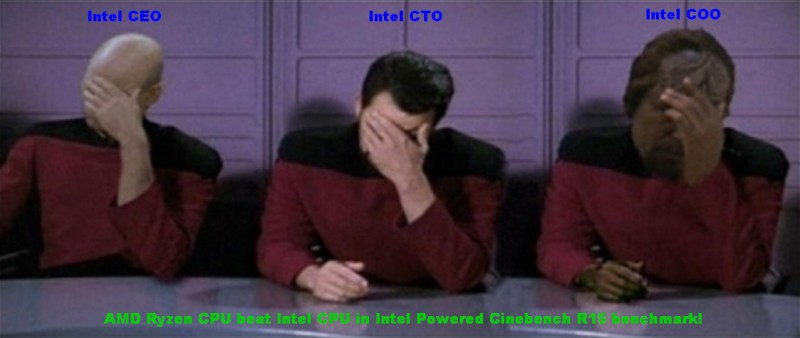This is where I'm convinced you're mistaken.
Intel isn't getting $500 for a 9900k because it costs that much to produce, it's because A) people will pay it, and B) supply problems. As they get more 14nm production lines running B goes away, and when Zen 2 launches A does too.
IDK how low Intel can sell a 9900k and make a profit, but it's probably under $200.
So, you have a $500 AMD 12-core competing not against an absurdly overpriced Intel 8-core, but a (probably still overpriced, but in the same range) 10 or 12-core, and a (let's say) $250 9900k. That's a much different picture, and if AMD doesn't have an *undeniable* advantage, Intel's mindshare will win 9/10 times.
AMD simply CANNOT afford to waste months playing catch-up in a tit-for-tat price battle, they need to *WIN*.
If they make buying a 9900k a stupid decision, THAT is how they'll gain marketshare, THEN they can start charging higher prices. Probably never as crazy as Intel during the Bulldozer years, but premium, competitive, prices.
Intel isn't going away, and they didn't become Chipzilla by designing bad products.
AMD will only have a few years before Intel has an answer to Zen 2/3/4, they gotta go for the throat.
"Winning" isn't something that shareholders of western corporations are directly interested in. It's profits. It always has been. Now, one can argue with some merit that such a narrow strategy, of which shows limited long-term vision, is a wise one overall, but it's definitely the standard.
We don't really have any evidence that AMD would be interested in a severe price war, or sacrificing enormous amounts of margins to any real extreme.
When 1800X came out, it was 3.6Ghz and MSRP'd @ $499. It was a faster MT, slower ST product. The rest of the Zen 1xxx family was similarly scaled. Better deal overall, but nothing that was extreme, although it did pants the silly overpriced workstation offerings from Intel in a lot of ways if your workload was a match.
Sales were GOOD, prices came down later.
When 2700X came out, it was 3.7/4.3 and $329. Again a faster MT, slower ST product that was competitively priced. Gaming was still solidly on Intel, but MT was again a better deal with AMD. And AMD's option was a wide open road for 1xxx buyers, unlike Intel and their silly chipset games.
Sales were GOOD, prices came down later, though not as much (reputation and market share increasing).
When Polaris came out, it was a pretty compelling bargain, but not insanely so. Sadly, it got hijacked by the mining crisis and gains with gamers and general PC enthusiasts were muted because they were suddenly selling for 200-400% of MSRP.
When Vega56/64 came out, MSRP was roughly in line with Nvidia's options. Of course, this got also hijacked by continued mining mania, so it didn't get much play.
If we go by history, then they will be a better buy than Intel for a lot of people, but not to the point of cutting their own margins more than absolutely necessary. Their CPU reputation and hype is very high, the end of the mining craze and old console gen is feeding a very resurgent PC gaming scene, and quality Zen2 products won't need to be priced at cut rates to sell through. Especially if 7nm volume isn't enough to supply it anyway.
Going further back in history to the time of outright AMD supremacy : the AMD Socket 939/754/AM2 products of 2004 through Conroe were priced as complete flagships from top to bottom. $1k 'FX', $300-$850 X2s, and on and on. They were better, and they charged absolute top dollar.
Leadership and overall direction may change, but publicly traded corporate strategy virtually never wavers : make every penny possible this quarter. The only thing that can drive down prices is : lack of demand, and competition. That's it. If Zen2 is extremely good, then it's going to make AMD a ton of money and sell really well. But we're not going to get charity, or a self-sacrificing price war for indeterminate reasons. Like, what would be the goal to going ham with price wars? Intel wouldn't go under, they have enough cash to sit on their hands for donkey's years. Their reputation wouldn't get any better. The quality of their products has been speaking for itself, and their Ryzen stuff has been a home run even if it's not 100% the best at every task. Market share? That lasts only for as long as you have the price/performance and tiers to support. If Intel came out with 10nm/whatever products that reclaimed the throne at competitive prices, then buyers would simply go there for that timeframe. Outside of a few brand loyalist goofs, people generally buy what they perceive as the best choice for their money. And if they think they need more brand awareness, then actual marketing to the wider world would be the way to go.
Shower me in $250 9900k killers, but man, it seems wildly optimistic to me.
I'd put solidly better than even odds that Zen2 SKUs can match or beat Intel's CL lineup in most things (stock v stock).
I'd put extremely low odds that pricing will be outside of the norms we've seen for ages now. Beating Intel on price/performance, unless they gain a full IPC win, then we'll see outright flagship level pricing and profiteering. It's capitalism, and their SH will demand so.



